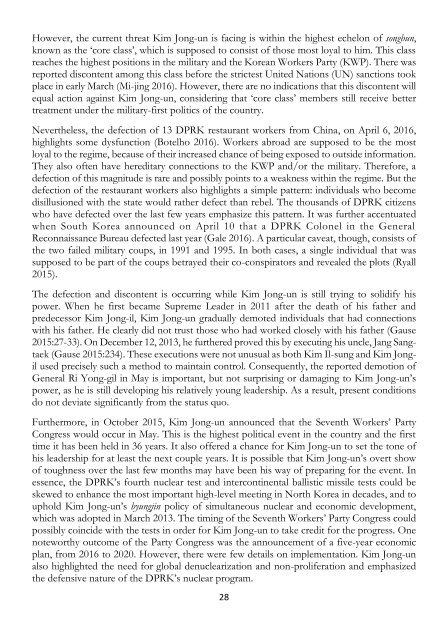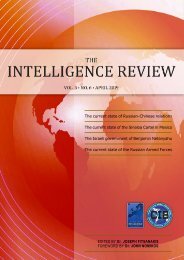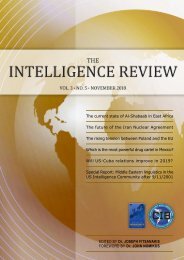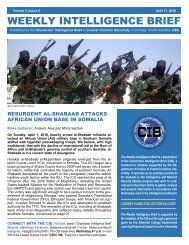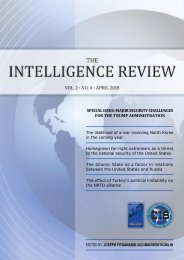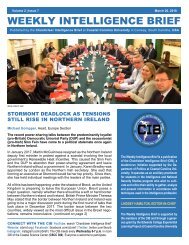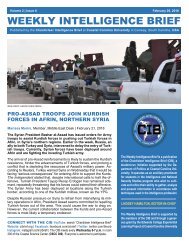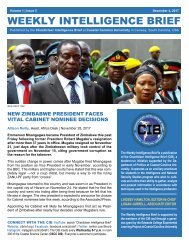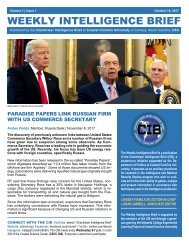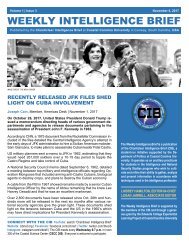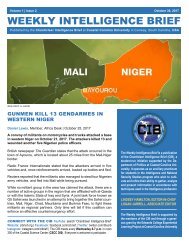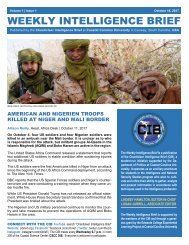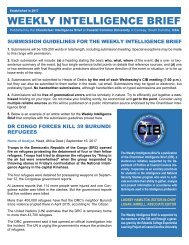The Intelligence Review | volume 1 | issue 1
This volume is the product of a collaboration between the European Intelligence Academy (EIA) and the Chanticleer Intelligence Brief (CIB), a student-run initiative supported by the Department of Politics at Coastal Carolina University in Conway, South Carolina, United States. Eleven CIB analysts tackle some of the most pressing and timely questions confronting intelligence observers today. Topics range from the price of oil to political stability in Venezuela, from the territorial cohesion of Iraq to the future of the Islamic State, and many other pressing subjects that feature daily in news headlines. CIB analysts propose carefully crafted and informed forecasts that outline future developments in some of the world's most unpredictable hot spots.
This volume is the product of a collaboration between the European Intelligence Academy (EIA) and the Chanticleer Intelligence Brief (CIB), a student-run initiative supported by the Department of Politics at Coastal Carolina University in Conway, South Carolina, United States. Eleven CIB analysts tackle some of the most pressing and timely questions confronting intelligence observers today. Topics range from the price of oil to political stability in Venezuela, from the territorial cohesion of Iraq to the future of the Islamic State, and many other pressing subjects that feature daily in news headlines. CIB analysts propose carefully crafted and informed forecasts that outline future developments in some of the world's most unpredictable hot spots.
You also want an ePaper? Increase the reach of your titles
YUMPU automatically turns print PDFs into web optimized ePapers that Google loves.
However, the current threat Kim Jong-un is facing is within the highest echelon of songbun,<br />
known as the ‘core class’, which is supposed to consist of those most loyal to him. This class<br />
reaches the highest positions in the military and the Korean Workers Party (KWP). <strong>The</strong>re was<br />
reported discontent among this class before the strictest United Nations (UN) sanctions took<br />
place in early March (Mi-jing 2016). However, there are no indications that this discontent will<br />
equal action against Kim Jong-un, considering that ‘core class’ members still receive better<br />
treatment under the military-first politics of the country.<br />
Nevertheless, the defection of 13 DPRK restaurant workers from China, on April 6, 2016,<br />
highlights some dysfunction (Botelho 2016). Workers abroad are supposed to be the most<br />
loyal to the regime, because of their increased chance of being exposed to outside information.<br />
<strong>The</strong>y also often have hereditary connections to the KWP and/or the military. <strong>The</strong>refore, a<br />
defection of this magnitude is rare and possibly points to a weakness within the regime. But the<br />
defection of the restaurant workers also highlights a simple pattern: individuals who become<br />
disillusioned with the state would rather defect than rebel. <strong>The</strong> thousands of DPRK citizens<br />
who have defected over the last few years emphasize this pattern. It was further accentuated<br />
when South Korea announced on April 10 that a DPRK Colonel in the General<br />
Reconnaissance Bureau defected last year (Gale 2016). A particular caveat, though, consists of<br />
the two failed military coups, in 1991 and 1995. In both cases, a single individual that was<br />
supposed to be part of the coups betrayed their co-conspirators and revealed the plots (Ryall<br />
2015).<br />
<strong>The</strong> defection and discontent is occurring while Kim Jong-un is still trying to solidify his<br />
power. When he first became Supreme Leader in 2011 after the death of his father and<br />
predecessor Kim Jong-il, Kim Jong-un gradually demoted individuals that had connections<br />
with his father. He clearly did not trust those who had worked closely with his father (Gause<br />
2015:27-33). On December 12, 2013, he furthered proved this by executing his uncle, Jang Sangtaek<br />
(Gause 2015:234). <strong>The</strong>se executions were not unusual as both Kim Il-sung and Kim Jongil<br />
used precisely such a method to maintain control. Consequently, the reported demotion of<br />
General Ri Yong-gil in May is important, but not surprising or damaging to Kim Jong-un’s<br />
power, as he is still developing his relatively young leadership. As a result, present conditions<br />
do not deviate significantly from the status quo.<br />
Furthermore, in October 2015, Kim Jong-un announced that the Seventh Workers’ Party<br />
Congress would occur in May. This is the highest political event in the country and the first<br />
time it has been held in 36 years. It also offered a chance for Kim Jong-un to set the tone of<br />
his leadership for at least the next couple years. It is possible that Kim Jong-un’s overt show<br />
of toughness over the last few months may have been his way of preparing for the event. In<br />
essence, the DPRK’s fourth nuclear test and intercontinental ballistic missile tests could be<br />
skewed to enhance the most important high-level meeting in North Korea in decades, and to<br />
uphold Kim Jong-un’s byungjin policy of simultaneous nuclear and economic development,<br />
which was adopted in March 2013. <strong>The</strong> timing of the Seventh Workers’ Party Congress could<br />
possibly coincide with the tests in order for Kim Jong-un to take credit for the progress. One<br />
noteworthy outcome of the Party Congress was the announcement of a five-year economic<br />
plan, from 2016 to 2020. However, there were few details on implementation. Kim Jong-un<br />
also highlighted the need for global denuclearization and non-proliferation and emphasized<br />
the defensive nature of the DPRK’s nuclear program.<br />
28


